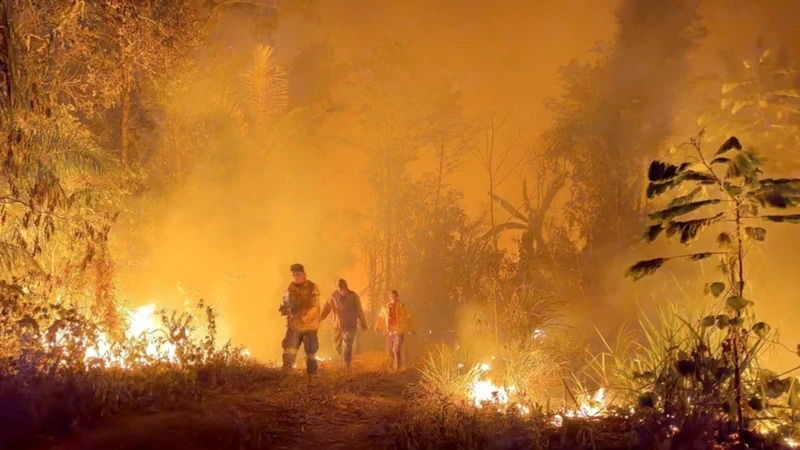Climate change warning bell
The consecutive forest fires in Hong Kong (China), Thailand, and especially the serious incidents in the US in recent days have sounded the alarm bell about the unpredictable consequences of climate change if not controlled in time.
 |
| Illustrative photo. |
In recent days, the dry weather in Hong Kong (China) has caused a forest fire to break out in Lam Tsuen Country Park in Yuen Long. Hong Kong rescue forces have dispatched helicopters to rescue hikers trapped in the area due to fire and strong winds.
In Thailand, fires have burned nearly 160 hectares of forest on Khao Loi Mountain in Nakhon Ratchasima Province, near Khao Yai National Park — a world heritage site.
Fire also seriously threatens the US state of California. Six wildfires that broke out simultaneously have devastated the Los Angeles area, resulting in at least 11 deaths and destroying more than 10,000 structures.
The wildfires have ravaged an area of 14,100 hectares, causing an estimated $150 billion in damages. US officials and media have warned that climate change is increasing the frequency and severity of wildfires, calling on the federal government to take more drastic measures to combat climate change.
The White House has also stressed that wildfires show that humans need to take stronger action to reduce greenhouse gas emissions.
Similarly, many US newspapers such as The New York Times and the Los Angeles Times have repeatedly emphasised that climate change is increasing the frequency and severity of wildfires.
The governor of California has declared a state of emergency and called for federal assistance to deal with one of the most serious wildfires in the state's history. California has deployed hundreds of firefighters, helicopters, and firefighting aircraft to contain the blaze.
Local authorities have also set up temporary shelters and provided medical and psychological support to affected residents. The Los Angeles Fire Department has deployed thousands of firefighters to control the blaze, but the dry weather and strong winds are making it difficult.
The wildfires come as the World Meteorological Organisation (WMO) confirmed that 2024 was the hottest year on record, marking a worrying milestone for global climate change.
Data from meteorological agencies in the UK, China, the European Union (EU), and the US shows that the average global temperature increase in 2024 reached 1.60C compared to the pre-industrial period.
2024 also became the first year with an average temperature clearly exceeding 1.5°C above the pre-industrial level — a threshold set by the Paris Agreement with the aim to significantly reduce the risks and impacts of climate change. The total economic losses due to climate change in 2024 are estimated to have reached 140 billion USD — the third highest level in history.
Samantha Burgess, strategic climate lead at Copernicus, stressed that the buildup of greenhouse gases from the burning of fossil fuels is the main cause of this situation.
Without urgent action, the world will continue to see rapid ice melt, rising sea levels, and ecosystems pushed to the brink of collapse, she warned.
Although 2025 is predicted to be less hot than 2024 thanks to the La Nina phenomenon, scientists warn that global temperatures will still be among the top three hottest years on record.
We have the power to change the trajectory from now on," Buontempo said. “The future of the planet is in our hands.”
Recent wildfire disasters are a warning of the enormous challenges posed by climate change and human unpreparedness for natural disasters. To reduce future losses, governments need to invest in forest management and disaster-resistant infrastructure.
Together with active community participation, timely action and solidarity are key factors in mitigating Mother Nature’s wrath and building a more sustainable future for our planet.
NDO





READER COMMENTS